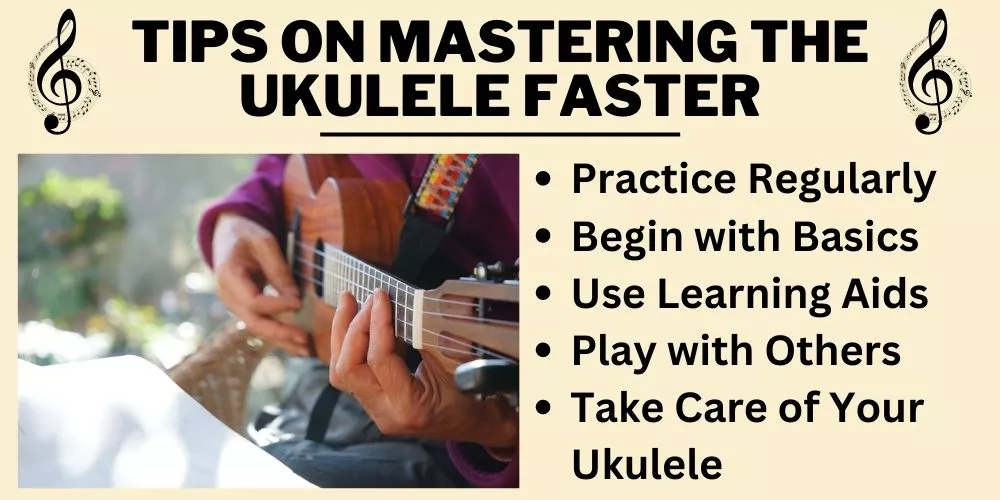As the charming sound of the ukulele sweeps through the airwaves and into our hearts, many people are discovering the joys of playing this versatile little instrument for themselves.
Suppose you’re considering picking up a ukulele and joining the ranks of budding ukulele enthusiasts.
In that case, you’re likely asking yourself one key question: “how long does it take to learn the ukulele?”
In this comprehensive guide, we’ll explore various aspects of learning the ukulele that will give you a clear idea of what to expect on your musical journey.

From the basics of chords and strumming patterns to skill development and practice routines, we’ll cover everything you need to know to become a confident ukulele player.
Grab your uke and let’s get started!
Contents
🎶How long does it take to learn ukulele?
When it comes to learning the ukulele, it boils down to several factors including your prior experience with musical instruments, the time you can devote to practice, and your learning pace.
- Beginners with No Prior Musical Experience: For beginners with no prior musical experience, you can get a hang of the basic chords and strumming patterns in about 10-20 hours of practice. Of course, this varies from person to person. This means if you practice an hour daily, you could play simple songs within 2-3 weeks.
- Intermediate Level: After learning the basics, moving on to the intermediate level where you’re smoothly transitioning between chords, expanding your chord knowledge, and experimenting with more complex strumming patterns might take you between 3 to 6 months.
- Proficiency: Gaining proficiency, however, where you’re playing more complex songs, exploring different genres, and potentially improvising your music, might take a year or even longer. It’s important to remember that proficiency is a journey, not a destination. There’s always more to learn and master!
As you embark on your ukulele journey, remember the key to success is consistent practice and abundant patience. Happy strumming!
🎶Tips on Mastering the Ukulele Faster
Mastering any instrument takes time, patience, and practice. But, we’ve compiled insightful tips to help you learn the ukulele more swiftly.
Each section provides detailed advice to assist you on your musical journey.

Practice Regularly
It might sound obvious, but consistent, regular practice is the fastest way to improve. Aim for short but daily practice sessions.
Spreading practice out across the week is more effective than one long session. Here are some suggestions:
- Set a Routine: Try to set a fixed time each day for practicing.
- Short Sessions: Divide your practice time into smaller sessions throughout the day rather than a single, long session.
- Warm-Up: Always start with a light warm-up to loosen your fingers.
Begin with Basics
Start with the basics and master them before moving to more complex techniques. Here’s a simple roadmap:
- Chords: Master basic ukulele chords such as C, G, Am, and F.
- Progressions: Practice common chord progressions.
- Strumming: Understand and practice basic strumming patterns.
Use Learning Aids
Technological advances have provided numerous resources to improve your skills:
- Online Lessons: Use online platforms such as YouTube or paid online ukulele courses for tutorials. They often break down techniques into easy-to-understand chunks.
- Apps: Utilize ukulele learning apps for regular practice.
- Metronomes: Practice with a metronome to improve your timing and rhythm.
Play with Others
Playing music with others offers a fun and effective method to get better:
- Jamming: Jam with friends or join a local ukulele club. Playing with others can improve your timing and allow you to learn from more experienced players.
- Performing: If you’re feeling brave, try performing in front of others. This can motivate you to practice more and hone your skills further.
Take Care of Your Ukulele
Instrument maintenance shouldn’t be overlooked:

- Regular Tuning: The ukulele needs to be tuned regularly.
- Fingerboard Maintenance: Occasional light cleaning and oiling of the fingerboard can keep it in good condition.
- Restringing: Strings lose their quality over time. Plan to change them approximately every 3-6 months.
Remember, mastery doesn’t come overnight. Be patient, and most importantly, enjoy your ukulele journey!
🎶What’s the best way to learn how to play Ukulele?
While there’s no one-size-fits-all answer to the best way to learn to play the ukulele, a combination of methods caters to different learning styles and preferences. Here’s a step-by-step guide for an effective learning experience:
- Research: Begin by researching the basics of the ukulele, including its history, anatomy, types, and sizes. This helps build a strong foundation and understanding of the instrument.
- Choose the Right Ukulele: Select a ukulele suited to your needs, skill level, and budget. Consider factors such as size (soprano, concert, tenor, or baritone), materials used, and overall sound quality.
- Learn the Basics: Familiarize yourself with the fundamental skills required for playing the ukulele, including tuning, fretting, and basic chord shapes.
- Find a Learning Resource: Choose a resource that aligns with your learning style, budget, and schedule. These options may include:
- In-person Ukulele Lessons: A structured learning environment with a qualified instructor. Provides immediate feedback and personalized attention.
- Online Ukulele Lessons: A more flexible, self-paced alternative to in-person lessons. Platforms like YouTube and other online courses offer various learning materials.
- Ukulele Books and Instructional Materials: For learners who prefer a more traditional approach, instructional books or video courses can be valuable.
- Ukulele Apps: Gamified apps designed to teach ukulele in a fun and interactive way. Can be used as a supplementary learning tool or to track progress.
- Practice Regularly: Set a consistent practice schedule and stick to it. Focus on mastering basic chords and strumming patterns first. Gradually incorporate more advanced techniques and variations.
- Play with Others: When you feel comfortable, join jam sessions, ukulele clubs, or play with friends to improve your skills further. This helps build confidence and provides valuable experience.
- Set Realistic Goals: Set achievable goals for your progress and celebrate your milestones. This may include learning a specific song or technique, joining a performance event, or recording yourself playing.
🎶Can You Teach Yourself Ukulele?
The simple answer is yes! With the advent of various learning resources, discipline, and of course, practice, you indeed can teach yourself ukulele. Here’s a comprehensive guide on how you can do it.

Choosing Your Ukulele
Your journey begins by picking the right ukulele. Different types of ukuleles, such as Soprano, Concert, Tenor, and Baritone, bring different tonal qualities.
Beginners often start with a Soprano or Concert ukulele due to their size and ease of playing. Choose one that feels comfortable in your hands and produces a sound you enjoy.
Learn the Layout of Your Ukulele
Familiarize yourself with the basics of your instrument, which includes understanding parts of your ukulele like the neck, frets, harmonic, and body.
Use Online Resources
The internet is a treasure trove of resources for budding ukulele players. Here’s how you can take advantage:
- YouTube: Channels like Ukulele Underground and The Ukulele Teacher are rich with tutorials for beginners and offer step-by-step guides to learning chords, strumming patterns, and even particular songs.
- Online Courses: Websites like Udemy or Coursera offer comprehensive courses that can take you from beginner to advanced at your own pace.
- Ukulele Tabs and Chord Diagrams: Websites that provide chord charts and tablatures are excellent visual aids to practice and master chord transitions.
Music Apps
A plethora of useful apps are available, which can facilitate your learning process:
- Tuner App: As a beginner, you may find tuning your ukulele by ear difficult. Apps like GuitarTuna, can quickly help you tune your ukulele.
- Metronome App: Improving your rhythm and timing is essential. Metronome apps can assist you in maintaining a steady tempo.
Regular Practice
Consistent practice is the key to developing your ukulele skills. Aim for regular short practice sessions rather than occasional lengthy ones.
Break down your practice sessions into warm-up, chord progression practice, learning a new song, and free play.
Experiment and Explore
Once you get a grip on the basics, start experimenting with different strumming patterns, fingerpicking styles, and genres of music.
Don’t be afraid to venture into more challenging songs or techniques.
Stay Patient and Enjoy the Journey
Learning to play an instrument isn’t a race. It’s okay to have slow days, and hitting plateaus is normal.
The key is to remain patient, stay consistent, and enjoy the process. Remember, playing the ukulele should be fun!
In a nutshell, while teaching yourself ukulele may seem challenging at first, it is entirely possible.
With the vast resources and a disciplined practice routine, you can teach yourself to strum some beautiful tunes on your ukulele.
🎶What’s the Hardest Part of Learning to Play Ukulele?
Playing any musical instrument, including the ukulele, presents certain challenges. Here’s a closer look at some of the often considered hardest parts of learning to play the ukulele:

Mastering Chords and Transitions
While the ukulele is known for having easier chord shapes than many stringed instruments, some chords can still pose a challenge to beginners.
For instance, the E and B flat chords require holding multiple strings down with one finger, which can be tricky initially.
Also, transitioning smoothly between chords while maintaining rhythm and pace can be hard. Acquiring the muscle memory needed can demand significant practice and patience.
Developing Strumming Techniques
Strumming might seem easy initially, but mastering various strumming patterns and maintaining the rhythm can be tough. It requires good hand-eye coordination and a sense of timing.
Fingerpicking
Fingerpicking or plucking individual strings in a particular rhythm, instead of strumming all the strings together, can be challenging. It necessitates precision, agility and coordination between your fingers.
Keeping in Tune
Ukuleles, especially the less expensive ones, tend to go out of tune quickly. Learning how to tune your ukulele and understanding when it’s in tune are important skills that can be challenging for beginners.
Overcoming Plateaus
As with learning any new skill, you may hit plateaus or periods when you feel like you’re not progressing. These could be due to being unable to master a chord change or strumming pattern. Overcoming these plateaus requires patience and persistence.
Keeping Motivated
It’s exciting to start learning an instrument, but maintaining motivation can be challenging after the initial enthusiasm wears off.
Setting small, achievable goals, and tracking your progress can help maintain your interest and excitement.
Though these areas may pose challenges, remember that you can overcome these hurdles with practice and patience. Remember that the learning journey is as important as the end goal, so enjoy every strum and chord you learn along the way.
🎶Frequently Asked Questions (FAQs)
Answer: Like any musical instrument, learning the ukulele might pose challenges like mastering chords and transitions, developing strumming techniques, and fingerpicking. However, it’s often considered one of the easier instruments to pick up, especially for beginners, because of its small size and fewer strings. Learning to play the ukulele with regular practice and patience can be a fun and rewarding experience.
Answer: Yes, you can learn to play the ukulele in 2 months. The timeframe largely depends on your dedication, the amount of time you can invest, and your learning methodology. With consistent practice and the right resources, you should be able to play simple songs and understand basic chord structures within this period.
Answer: The fastest way to learn to play the ukulele involves a combination of effective strategies. These include setting a regular practice routine, starting with basic chords and strumming patterns, using learning aids such as online lessons and apps, playing with others, and taking care of your ukulele. Remember that learning an instrument is not about speed but steady progress and enjoyment.
Answer: While learning to play the ukulele (or any instrument) proficiently takes time and practice, if you dedicate several hours each day to practice, you can learn to play some simple songs on the ukulele within a month. You can start by learning a few basic chords and strumming patterns, and gradually expand your skills. Remember that everyone learns at their own pace, and the goal should always be progress, not perfection.
Conclusion:
In conclusion, learning to play the ukulele is a unique journey, and the timeline varies greatly from one individual to another.
Many factors will influence the speed at which you progress, including your previous musical experience, the amount of practice you can put in, the quality of your learning resources, and your innate aptitude for playing music.
While it’s possible to learn the basics and strum along to simple songs in weeks, gaining a deeper understanding of the instrument and mastering more complex songs and techniques can take months, or even years.
The important thing is not to rush or put pressure on yourself.
Learning to play an instrument like the ukulele is a joyful and rewarding experience in and of itself, regardless of how long it takes. The journey is as important, if not more, as the destination.
So, take your time, enjoy every step of the learning process, and your commitment and passion for the ukulele will yield significant progress over time.
